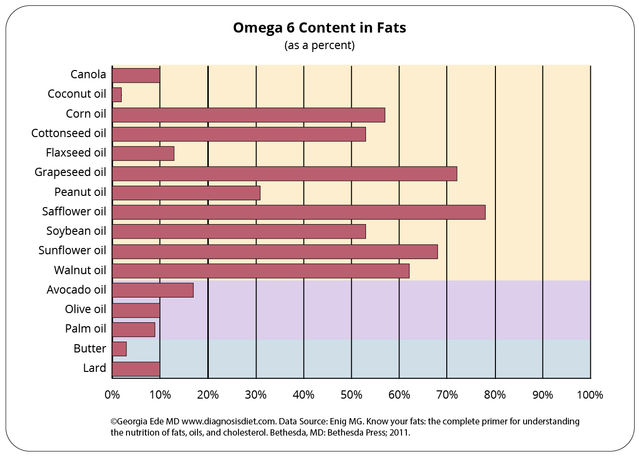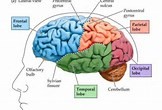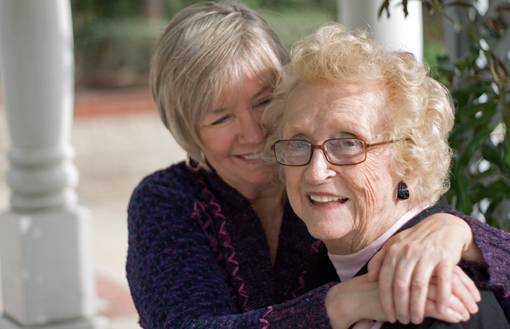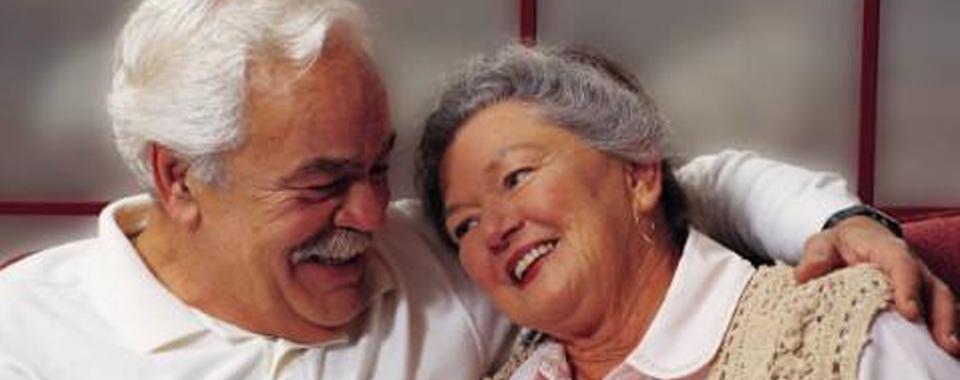The Alzheimer’s and dementia care journey
Caring for someone with Alzheimer's disease or dementia can be a long, stressful, and intensely emotional journey. But you're not alone. In the United States, there are about 15 million people caring for someone with dementia, and millions of others around the world. As there is currently no cure for Alzheimer's disease—and only limited medical treatments available for the symptoms—it is your caregiving that can make the biggest difference to your loved one's quality of life. That is a remarkable gift.
However, caregiving can also become all-consuming. As your loved one's cognitive, physical, and functional abilities diminish over a period of years, it's easy to become overwhelmed and neglect your own health and well-being. The burden of caregiving can put you at increased risk for significant health problems and an estimated 30 to 40 percent of dementia caregivers will experience depression, high levels of stress, or burnout. Nearly all Alzheimer's or dementia caregivers will at some time experience sadness, anxiety, loneliness, and exhaustion. Seeking help and support along the way is not a luxury for caregivers; it's a necessity.
Just as each individual with Alzheimer's disease progresses differently, so too can the caregiving experience vary widely from person to person. However, there are strategies that can help make the caregiving journey as rewarding as it is challenging. Learning all you can about what is happening and what to expect on the Alzheimer's journey will not only help your loved one, but is also the first step towards protecting your own mental and physical health.
The challenges and rewards of Alzheimer’s care
Caring for a person with Alzheimer’s disease can often seem to be a series of grief experiences as you watch your loved one’s memories disappear and skills erode. The person with Alzheimer's will change and behave in different, sometimes disturbing or upsetting ways. For both caretakers and their patients, these changes can produce an emotional wallop of confusion, anger, and sadness.
As the disease advances, your loved one’s needs will increase and your caregiving responsibilities will become more challenging. At the same time, the ability of your loved one to show appreciation for all your hard work will diminish. Caregiving can literally seem like a thankless task. For many, though, a caregiver’s long journey includes not only challenges, but also many rich, life-affirming rewards.
Challenges of Alzheimer's care:
- Overwhelming emotions as capabilities lessen
- Fatigue and exhaustion as caregiving demands increase
- Isolation and loneliness as independence disappears
- Financial and work complications as costs rise and resources are challenged
Rewards of Alzheimer's care:
- Bonds deepen through care, companionship, and service
- Problem solving and relationship skills grow through experience
- New relationships form through education and support
- Unexpected rewards develop through compassion and acceptance
Preparing for the road ahead
The more you learn about your loved one’s disease and how it will progress over the years, the better you’ll be able to prepare for future challenges, reduce your frustration, and foster reasonable expectations. In the early stages of Alzheimer’s, for example, you can support your loved one’s independence and self-care, but the person’s cognitive and physical regression means he or she will ultimately require 24-hour care.
Though it may be hard to contemplate such a difficult outlook, the sooner you put plans in place, the more your loved one can be involved in the decision-making process. Paying for long-term care can be a major source of stress, so it’s important to research all your options as early as possible. Consult with the patient’s medical team and other family members to make legal and financial arrangements and determine the long-term care options that are best suited to you and your loved one.
Developing your own personal support plan ahead of time
Balancing the enormous task of caring for a cognitively-impaired adult with your other responsibilities requires skill, attention, and meticulous planning. By focusing so diligently on your loved one’s needs, it’s easy to fall into the trap of neglecting your own health. But that will not only hurt yourself, but also hurt the person you’re trying to care for. If you’re not getting the physical and emotional support you need, you won’t be able to provide the best level of care, and you face becoming overwhelmed.
Ask for help. It’s important to reach out to other family members, friends, or volunteer organizations to help with the daily burden of caregiving. Accepting help for mundane tasks such as grocery shopping and cleaning can free you up to spend more quality time with the patient. When someone offers to help, let them. You’re not being neglectful or disloyal to your loved one. Caregivers who take regular time away not only provide better care, they also find more satisfaction in their caretaking roles.
Learn or update caregiving skills. Being thrust into the role of caregiver doesn't come with an instruction manual, but there are books, workshops, and online training resources that can teach you the skills you need. Learn all you can about symptoms, treatment, and behavior management. As the disease progresses and challenges change, you’ll need to update your skillset and find new ways of coping.
Join a support group. You'll find that you're not alone and you’ll be able to learn from the experiences of others who have faced the same challenges. Connecting with others who know first-hand what you’re going through can also help reduce feelings of isolation, fear, and hopelessness.
Learn how to manage stress. Caregiving for a loved one with dementia can be one of the most stressful tasks you’ll undertake in life. To combat this stress, you need to activate your body's natural relaxation response through techniques such as deep breathing, meditation, rhythmic exercise, or yoga. Fitting these activities into your life can help reduce the stress of caregiving and boost your mood and energy levels.
Make use of available resources. There are a wealth of community and online resources to help you prioritize your efforts and provide effective care. Start by finding the Alzheimer’s association in your country. These organizations offer practical support, helplines, advice, and training for caregivers and their families. They can also put you in touch with local support groups. See Resources and References section below for a directory of associations.
Plan for your own care. Visit your doctor for regular checkups and pay attention to the signs and symptoms of excessive stress. It’s easy to abandon the people and activities you love when you’re mired in caregiving, but you risk your health and peace of mind by doing so. Take time away from caregiving to maintain friendships, social contacts, and professional networks, and pursue the hobbies and interests that bring you joy.
Signs of caregiver stress and burnout
No matter how strong and resilient you are, you’re still likely to have problems with certain aspects of Alzheimer’s or dementia care. The stress of day-to-day care, watching your loved one’s health deteriorate, and having to make difficult decisions about long-term care can leave anyone feeling overwhelmed and exhausted. Recognizing the signs of caregiver stress and burnout is the first step to dealing with the problem.
10 Signs of Caregiver Stress
If you experience any of these signs of stress on a regular basis, make time to talk to your doctor.
1. Denial about the disease and its effect on the person who has been diagnosed. "I know Mom is going to get better."
2. Anger at the person with Alzheimer's, anger that no cure exists, or anger that people don't understand what's happening. "If he asks me that one more time I'll scream!"
3. Social withdrawal from friends and activities that once brought pleasure. "I don't care about getting together with the neighbors anymore."
4. Anxiety about the future. "What happens when he needs more care than I can provide?"
5. Depression that begins to break your spirit and affects your ability to cope. "I don't care anymore."
6. Exhaustion that makes it nearly impossible to complete necessary daily tasks. "I'm too tired for this."
7. Sleeplessness caused by a never-ending list of concerns. "What if she wanders out of the house or falls and hurts herself?"
8. Irritability that leads to moodiness and triggers negative responses and actions. "Leave me alone!"
9. Lack of concentration that makes it difficult to perform familiar tasks. "I was so busy, I forgot we had an appointment."
10. Health problems that begin to take a mental and physical toll. "I can't remember the last time I felt good."
Source: Alzheimer's Association
When prolonged and excessive stress from caring for a loved one with Alzheimer’s or dementia leaves you feeling emotionally, mentally, and physically exhausted, you may be facing burnout. Burnout reduces your productivity and saps your energy, leaving you feeling helpless, hopeless, angry, and resentful. Eventually, you may feel like you have nothing more to give.
The warning signs of caregiver burnout include:
- Excessive stress and tension
- Debilitating depression
- Persistent anxiety, anger, or guilt
- Extreme irritability or anger with the dementia patient
- Decreased overall life satisfaction
- Relationship conflicts and social isolation
- Lower immunity and greater need for healthcare services
- Excessive use of medications, drugs, or alcohol
Burnout can damage your health and the health of the person you’re caring for, so if you recognize the signs, it’s important to take action right away.
Coping with stress and burnout
No matter the day-to-day demands of caregiving for a patient with Alzheimer’s or dementia, it’s imperative that you carve out time for your own self-care. These tips can help:
Seek regular respite care. You cannot do it all alone. Ask other family members, friends, or members of your place of worship for help with respite care so you can get a much needed break. You can also seek help from volunteer organizations, support groups, day care programs, and residential respite care facilities. Schedule frequent breaks throughout the day, take time out to pursue hobbies and interests, and stay on top of your own health needs. Seek professional help if you recognize you're exhibiting any warning signs of caregiver burnout.
Get moving. Regular exercise not only keeps you fit, it releases endorphins that can really boost your mood. Aim for at least 30 minutes of exercise on most days. If it’s difficult to get away for that long at once, break the time up into 10 minute sessions sprinkled throughout the day. Take a walk or jog outside, dance to your favorite music, work out to an exercise DVD, or cycle to the store. Taking a group exercise class or working out with friends can give you a valuable social outlet as well.
Talk to someone. Talk to a trusted friend, family member, clergy member, or therapist, about how you feel and what you’re going through. The person you talk to doesn’t have to be able to solve your problems, he or she just has to be a good listener. The simple act of talking face-to-face with someone who cares can be extremely cathartic. Opening up won’t make you a burden to others. In fact, most friends will be flattered that you trust them enough to confide in them, and it will only strengthen your bond.
Take time to play. In the early stages of Alzheimer’s disease, include your loved one in short walks, board games, or jigsaw puzzles. Join an online scrabble tournament, practice your golf swing, or play with a pet. A daily dose of fun is good medicine, and doesn’t require money, a car, or huge blocks of time.
Try something new. Challenge yourself to learn a new skill while you are “on the job.” Order a self-paced foreign language program or try an exercise video game. From tennis to golf to pitching a strike, so-called “exergames” offer living room-friendly activities for every age and skill level. With just a few minutes of practice each day, you can flex mental muscle and relieve harmful stress.
See the funny side. Humor is a well-known antidote to stress, sadness, illness, and boredom. Give yourself permission to chuckle at the absurdities you and your loved one experience, and surround yourself with laughter. Instead of heavy dramas on TV or video, go for a hearty belly laugh by watching episodes of your favorite sitcom. Your infectious good mood can help replenish your inner resources and sooth your loved one.
Making time for reflection can help with acceptance
One of the biggest challenges as a caretaker for someone with Alzheimer’s or dementia is to accept what is happening to your loved one. At each new stage of the disease, you have to alter your expectations about what your loved one is capable of. By accepting each new reality and taking time to reflect on these changes, you can better cope with the emotional loss, and deepen the feelings of satisfaction and love in your role as caretaker.
Keep a daily journal to record and reflect on your experiences. By journaling your thoughts, you can mourn losses, celebrate successes, and look for those thought patterns that keep you from acting in the present.
Count your blessings. A daily gratitude list can chase away the blues and let you focus on what your loved one is still capable of, rather than the abilities he or she has lost.
Celebrate what is possible. Your loved one still has many abilities. Structure activities to invite participation on whatever level is possible, and you will both find real enjoyment.
Try to envision your loved one’s world. Imagine not being able to remember and do life’s simple tasks. By valuing what your loved one is able to give, you can find satisfaction on even the toughest days.
Practice relaxation techniques. Meditation, deep breathing, visualization, mindfulness, yoga, or rhythmic exercise can calm, restore, and promote happiness. Experiment with different techniques to find the ones that work best for you.
Improve emotional awareness. Remaining engaged, focused, and calm in the midst of such tremendous responsibility can challenge even the most capable caregivers. By developing your emotional awareness skills, however, you can relieve stress, experience positive emotions, and bring new peace and clarity to your caretaking role.
Tap into the rewards of connecting with the person you're caring for
Even when the person you’re caring for can no longer verbally express love or appreciation, you can find a deeper sense of reward in your role as caregiver by making time each day to really connect with the person. Avoid all distractions and focus fully on the person. Make eye contact (if that’s possible), hold the person’s hand or stroke his or her cheek, and talk in a calm, reassuring tone of voice. When you connect in this way, you’ll experience a process that boosts your mood, reduces stress, and supports your physical and emotional well-being. And it can also have the same effect on your loved one.
How to help an Alzheimer's or dementia caregiver
If a friend or family member is caring for someone with Alzheimer’s or dementia, it’s important to offer all the help and support you can.
Don’t wait to be asked to help. Many caregivers find it difficult to ask others for help, no matter how much they may need it, so make the offer. And when you do, be specific. As well as simply asking, “What can I do to help?” make suggestions like, “I’m free tomorrow afternoon, can I sit with the patient while you take a break?” or “What can I get you from the grocery store today?” Helping out with even the most simple or mundane chores can free the caregiver up to spend more quality time with the patient or take a break to recharge his or her batteries.
Be a friend. Caregivers are prone to withdrawing from family and friends but they still need regular contact with the outside world. Phone calls, texts, or emails are fine, but nothing beats a personal visit to lift a caregiver’s mood. Again, don’t wait to be asked; be the one to reach out.
Be a good listener. Venting frustrations about caregiving can be a great stress reliever. Listen to the caregiver’s fears and concerns without judging.
Show your gratitude. If the caregiver is a sibling looking after your parent, for example, it’s important to express your gratitude. The person with mid- or late-stage Alzheimer’s or dementia may not able to show appreciation to the caretaker so it’s important other family members recognize the caregiver’s hard work and sacrifice and regularly show their appreciation. While a card or a simple “Thank you” can go a long way, when accompanied by the offer of some respite, it can be a blessing.
Recognize the signs of caregiver stress and encourage the caregiver to focus more on his or her own health and well-being.




















